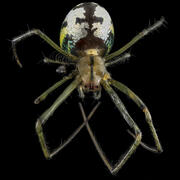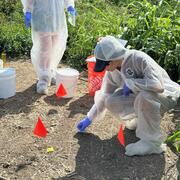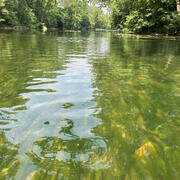Invasive Species
Developing Methods and Techniques to Control the Spread of Invasive Species
Developing Methods and Techniques to Control the Spread of Invasive Species
Columbia Environmental Research Center
Welcome to the Columbia Environmental Research Center. Our research focuses on environmental contaminants and the effects of habitat alterations on aquatic and terrestrial ecosystems.
News
WEBINAR: USGS Invasive Species Science - Innovation for a Healthy Nation
WEBINAR: USGS Invasive Species Science - Innovation for a Healthy Nation
USGS and state partners to test bait platforms to catch invasive carp in Upper Mississippi River
USGS and state partners to test bait platforms to catch invasive carp in Upper Mississippi River
Inaugural USGS Wildlife Health Awareness Day - April 25, 2025
Inaugural USGS Wildlife Health Awareness Day - April 25, 2025
Publications
Are behavioural ecotoxicity endpoints relevant at the population level? Evidence-based insights for environmental protection Are behavioural ecotoxicity endpoints relevant at the population level? Evidence-based insights for environmental protection
A substantial body of evidence exists demonstrating that exposure to environmental contaminants can alter animal behavior. Moreover, methodological and technological advancements, as well as increasing standardization, mean that behavioral ecotoxicity studies are more rigorous and reliable than ever before. Despite this, behavioral data are still seldom used in the risk assessment and...
Potential thiamine deficiency of phytoplankton across a productivity gradient and seasons in Ohio lakes Potential thiamine deficiency of phytoplankton across a productivity gradient and seasons in Ohio lakes
Although nitrogen and phosphorus deficiency of algal blooms have been the focus of substantial attention, organic nutrients can limit algal growth in aquatic systems. Growing evidence indicates thiamine (vitamin B1) can influence the community of primary producers in marine systems, but comparatively little is known about the effect of thiamine on freshwater algal productivity.We...
Spatial distribution and relative biomass of bigheaded carps in Lake Balaton, Hungary estimated from an environmental DNA survey Spatial distribution and relative biomass of bigheaded carps in Lake Balaton, Hungary estimated from an environmental DNA survey
Silver carp (Hypophthalmichthys nobilis), bighead carp (H. molitrix) and their hybrids, collectively known as bigheaded carps, have been introduced to Lake Balaton, Hungary. The current stock sizes are difficult to assess. We investigated environmental DNA (eDNA) techniques targeted for bigheaded carps, assessed the spatial distribution of eDNA in Lake Balaton, compared eDNA...
Science
From Stream to Spider: How PFAS Move Through Aquatic and Terrestrial Food Webs
Per- and polyfluoroalkyl substances (PFAS) are persistent synthetic chemicals that accumulate in the environment and living organisms. A USGS study examined how different PFAS compounds move through a stream ecosystem and are transferred from aquatic to terrestrial food webs. The findings documented that not all PFAS behave the same once they enter the environment, leading to differences in...
eDNA and the Efficacy of Management Actions
Environmental DNA (eDNA) is a powerful feedback tool, giving managers fast, clear, and cost-effective evidence to guide decisions and improve conservation outcomes.
By
Ecosystems Mission Area, Biological Threats and Invasive Species Research Program, Environmental Health Program, Species Management Research Program, Alaska Science Center, Columbia Environmental Research Center, Eastern Ecological Science Center, Forest and Rangeland Ecosystem Science Center, Fort Collins Science Center, Great Lakes Science Center, National Wildlife Health Center, Northern Prairie Wildlife Research Center, Northern Rocky Mountain Science Center, Pacific Island Ecosystems Research Center, Southwest Biological Science Center, Upper Midwest Environmental Sciences Center, Western Ecological Research Center (WERC), Western Fisheries Research Center, Wetland and Aquatic Research Center , Pacific Northwest Environmental DNA Laboratory
eDNA for Water-Quality Monitoring and Public Health Protection
By analyzing genetic traces left behind in water, eDNA provides early warning signs of problems—helping managers respond faster, protect public health, and keep freshwater ecosystems resilient.
By
Ecosystems Mission Area, Biological Threats and Invasive Species Research Program, Environmental Health Program, Alaska Science Center, Columbia Environmental Research Center, Eastern Ecological Science Center, Forest and Rangeland Ecosystem Science Center, Fort Collins Science Center, Great Lakes Science Center, National Wildlife Health Center, Northern Prairie Wildlife Research Center, Northern Rocky Mountain Science Center, Pacific Island Ecosystems Research Center, Upper Midwest Environmental Sciences Center, Western Ecological Research Center (WERC), Western Fisheries Research Center, Wetland and Aquatic Research Center , Pacific Northwest Environmental DNA Laboratory






